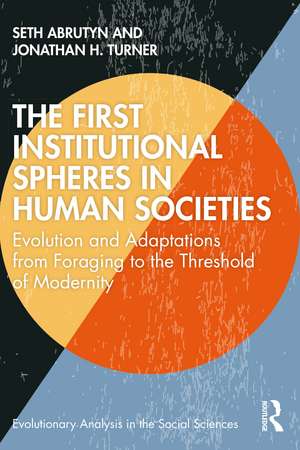The First Institutional Spheres in Human Societies: Evolution and Adaptations from Foraging to the Threshold of Modernity: Evolutionary Analysis in the Social Sciences
Autor Seth Abrutyn, Jonathan Turneren Limba Engleză Paperback – 16 mar 2022
| Toate formatele și edițiile | Preț | Express |
|---|---|---|
| Paperback (1) | 310.84 lei 43-57 zile | |
| Taylor & Francis – 16 mar 2022 | 310.84 lei 43-57 zile | |
| Hardback (1) | 1000.27 lei 43-57 zile | |
| Taylor & Francis – 16 mar 2022 | 1000.27 lei 43-57 zile |
Preț: 310.84 lei
Nou
Puncte Express: 466
Preț estimativ în valută:
59.49€ • 61.31$ • 50.23£
59.49€ • 61.31$ • 50.23£
Carte tipărită la comandă
Livrare economică 03-17 martie
Preluare comenzi: 021 569.72.76
Specificații
ISBN-13: 9781032124087
ISBN-10: 1032124083
Pagini: 482
Ilustrații: 13 Tables, black and white; 22 Line drawings, black and white; 1 Halftones, black and white; 23 Illustrations, black and white
Dimensiuni: 152 x 229 x 31 mm
Greutate: 0.4 kg
Ediția:1
Editura: Taylor & Francis
Colecția Routledge
Seria Evolutionary Analysis in the Social Sciences
Locul publicării:Oxford, United Kingdom
ISBN-10: 1032124083
Pagini: 482
Ilustrații: 13 Tables, black and white; 22 Line drawings, black and white; 1 Halftones, black and white; 23 Illustrations, black and white
Dimensiuni: 152 x 229 x 31 mm
Greutate: 0.4 kg
Ediția:1
Editura: Taylor & Francis
Colecția Routledge
Seria Evolutionary Analysis in the Social Sciences
Locul publicării:Oxford, United Kingdom
Public țintă
Postgraduate and Undergraduate AdvancedCuprins
Introduction
- On the Origins of Human Capacities
- Selection as the Force Driving Institutional Evolution
- Building Human Institutions
- The Dynamics of Institutional Autonomy
- The First Human Institution: The Evolution of the Nuclear Family and Kinship
- The Elaboration of Kinship
- The Emergence of Polity in Human Societies
- The Increasing Autonomy of Polity
- The Emergence of Religion
- Religious Evolution and Religious Autonomy
- The Emergence of Economy
- The Emergence of Law
- Legal Autonomy and the Expanding Institutional Infrastructure
- Institutional Evolution To The Brink of Modernity
- Institutional Evolution and Stratification
- The Evolved Institutional Order and the West
Recenzii
A bold departure from the current fragmented vision of social organization that characterizes most of the field of sociology, The First Institutional Spheres in Human Societies' breadth and depth is rarely paralleled except for in the authors’ previous work. This book holds the potential to be a discipline-influencing book. Abrutyn and Turner tell the story of the emergence of institutions, in all of its complexity, to shed light on how this level of social organization emerged and how this level of social organization works. They detail how biology and social organization interact to generate the emergence of human institutions. Their historical approach to the phenomenon gives us a particular sort of insight that we could not get by only looking at current instantiations of institutions.
Erika Summers-Effler, Notre Dame University
Erika Summers-Effler, Notre Dame University
Descriere
This book expands a foundational definition of the institution, one which locates them as the basic building blocks of human societies – as structural and cultural machines for survival that make it possible to pass precious knowledge from one generation to the next, ensuring the survival of our species.








